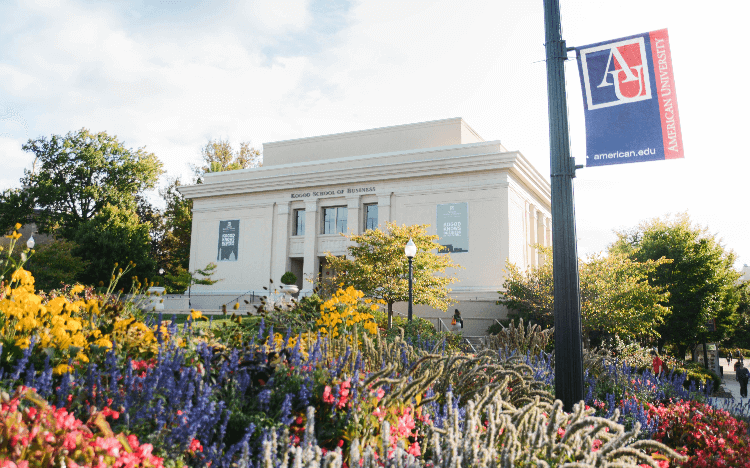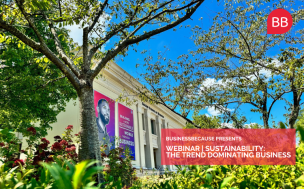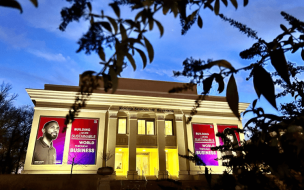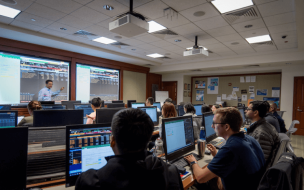As the climate crisis demands a rapid response from society, business schools need to arm the workforce with graduates primed for careers in sustainability. Cue American University’s Kogod School of Business.
The school’s MS in sustainability management (MSSM) program is creating business leaders with the skills to make a difference in industries through actions, not words.
The program's director of the MSSM program, David Bartlett, says that despite what’s happening at a political level, sustainability is still a key priority for American businesses.
“In the wake of Donald Trump’s election, his withdrawal from the Paris Climate Accord, his assault on the Environmental Protection Agency, and the climate change denying ethos that seems to have penetrated the entire Republican party, I think there’s a perception that––at a national level at least––the United States has retreated as a leader in sustainability.”
This simply isn’t the case, he says. Instead, the charge to create a more sustainable future has been taken up by companies and nonprofit organizations like American University, which was the first research university in the US to achieve net carbon neutrality.
Sustainable business practices underpin the MSSM program
MSSM students can complete the program in 12 to 24 months, and choose among four career focuses: becoming a sustainability policy and communications executive, a sustainability consultant, a sustainability entrepreneur, or a sustainability executive. Students learn the fundamentals of innovation, risk assessment, and lean supply chain––all under the umbrella of sustainability.
“The program provides students with basic business skills in accounting, finance, marketing, and data analytics, but this is all situated within the context of an interdisciplinary, sustainability-focused curriculum,” David explains.

By the end of the program, graduates have the comprehensive skill-set needed to enact economic, ecological, and socially responsible solutions across the private, public, and nonprofit sectors.
“Our sustainability program is different because it's housed in the business school itself and takes an explicit corporate perspective on sustainability, combined with elective courses students can take outside the business school," he says.
MSSM students also participate in an international residency which runs once a year. In the past, students have visited green hubs in Europe, such as Sweden and Denmark. While there, they work on projects with local companies.
“It adds an experiential focus to the program,” David says. “These live projects we run with local and international partners are treated as consulting projects. They provide our students with the opportunity to apply the tools and methodologies from our residential classes to actual cases.”
Taking advantage of sustainable opportunities in Washington, DC
To fill the sustainability void left by US leadership, globally renowned non-governmental organizations (NGOs)––like the World Wildlife Fund, the National Geographic Society, the Nature Conservancy, and more––have stepped forward to tackle climate change.
“There are sub-national agents all over the world, including US corporations, that are moving in the right direction,” David explains. “These corporations don’t have a regulatory pistol pointed at their head to adopt sustainability practices––they’re voluntarily doing so.”

With many heavily influential organizations headquartered in DC, David is always encouraging students to step beyond the boundaries of Kogod and take advantage of the career opportunities for MSSM graduates right on Kogod's doorstep. Top employers include the Environmental Defense Fund, the World Wildlife Fund, the US Department of Energy and Environment, and the World Bank.
Putting sustainable business into practice
One key focus of the MSSM program is preparing students to work within the multifaceted sustainability industry, from the global nonprofits to smaller, innovative start-ups.
“A lot of the most interesting work that’s being done in the sustainability space right now is off the radar––start-up companies, social enterprises, and boutique consulting firms,” David says.
He emphasizes that the program gives MSSM graduates the intellectual agility to adapt to different disciplines when moving across adjacent industries––wherever that may take them.
Putting these innovative, business-savvy thinkers in a strong position to tackle environmental, social, and governmental issues around the globe is one of the most important methods to promote change in businesses of all sizes, he says.

“There needs to be more urgency around incorporating sustainable practices,” he concludes. “The Intergovernmental Panel on Climate Change (IPCC) reports show that we basically have around 10 years left to make drastic changes. If we pass this threshold, the damage will be irreversible.”
With the deadline approaching, businesses must act fast. As more industries switch their focus to sustainability, Kogod graduates are ready to help them go green.
Student Reviews
Kogod School of Business - American University








